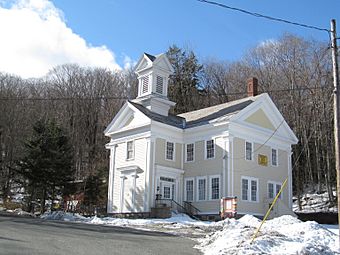North Becket Village Historic District facts for kids
Quick facts for kids |
|
|
North Becket Village Historic District
|
|

The Becket Arts Center
|
|
| Location | Main and High Streets, Becket, Massachusetts |
|---|---|
| Built | 1841 |
| Architectural style | Colonial Revival, Bungalow/Craftsman, Greek Revival |
| NRHP reference No. | 88000229 |
| Added to NRHP | July 26, 1988 |
The North Becket Village Historic District is a special area in Becket, Massachusetts. It's like a time capsule! This district protects a historic village that grew very quickly starting in 1841. That's when the Western Railroad arrived. Many buildings from that time, especially those in the beautiful Greek Revival style, are still standing. This important area was added to the National Register of Historic Places in 1988.
Contents
Welcome to North Becket Village!
This historic district is found in the Berkshire hills of Massachusetts. It shows us how a small village can change and grow. North Becket became a busy center for the town. It was a place where people lived, worked, and gathered.
A Peek into History
The town of Becket was first planned by settlers in the 1730s. But people didn't start living there until the 1750s. Becket officially became a town in 1765. The original town center was in a different spot, now called Becket Center. North Becket Village started growing later, around the 1820s, when a sawmill was built.
How the Railroad Changed Everything
A big change happened in 1841. The Western Railroad was finished. It ran along the West Branch of the Westfield River. This made North Becket grow super fast! The small streams flowing into the Westfield River became important. They provided water power for many factories. These factories could then easily send their goods to other towns using the new railroad.
Over about 20 years, many of the town's important buildings moved to North Becket. This included public places and churches. Many homes were also built, especially on the west side of Main and High Streets. These homes often showed the popular Greek Revival style.
What You'll See Today
The historic district stretches along Main and High Streets. It goes from Pleasant Street in the north to a spot south of South Washington State Road. The area covers about 40 acres. It has 35 buildings that are important to history. Most of these are homes. They are usually 1-1/2 to 2-1/2 stories tall. They are made of wood and built in the Greek Revival style.
Surviving the Flood
Sadly, most of the village's factories and shops were destroyed in 1927. A dam on Yokum Brook broke, causing a big flood. Many buildings were washed away, leaving only their foundations. Only two commercial buildings survived this flood.
However, some important public buildings are still here. These include the Baptist Meetinghouse, built in 1844. There's also the Second Congregational Church from 1850. And don't forget Seminary Hall, built in 1855. This building is probably the most fancy and detailed in the whole village.
 | James B. Knighten |
 | Azellia White |
 | Willa Brown |



